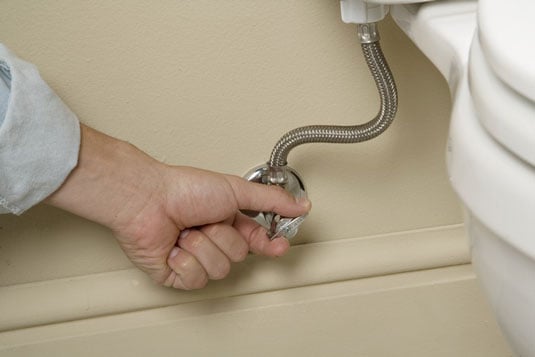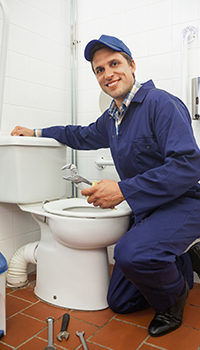Right here in the next paragraph you can find a lot of sound facts regarding Common Signs of a Faulty Toilet .

Plumbing issues at home don’t get worse than a faulty toilet. Faulty or poorly functioning toilets are a nightmare to house owners. Imagine doing your business in the bathroom, and the toilet won’t flush. It becomes embarrassing if it’s a shared toilet and someone else needs to use it. In other cases, no matter how much you flush, the water seems incapable of washing the whole thing away.
There are numerous signs that your toilet might be faulty, and we will briefly look at these signs and occurrences that, when noticed, you need to contact a professional plumbing service to either fix the toilet or reinstall it.
1. Clogs
Clogging toilets happen pretty regularly, and everyone experiences it once in a while. But if your toilet stops more frequently, you may need to have it checked. If you have kids at home, the chances are high that they may have tried flushing toys or fabrics down the drain at some point. A clogged toilet poses a significant threat to the sewage, especially when materials other than tissue papers and human waste are flushed down there. While a plunger can do most of the unclogging, you should call a professional if you notice that it happens very frequently. Your toilet might need more than just a plunging to get back in good shape.
2. Crack in the Tank
The first sign that your Tank may be cracked is the presence of water puddles near the base of your toilet. Cracks in the Tank are sometimes hard to detect, especially if it’s just a tiny one somewhere below the waterline. When you notice water settling on your toilet base, it is most probably indicative that your Tank has cracked, and you need to involve the plumbers to detect the spot and either fix it or replace it.
3. Leaky Toilet
Sadly, the only way you may realize you have a leaky toilet is when the water bills keep going up. Leaky toilets are terrible because they can cause lots of damage in the home, including creating a room for molds and mildews, ruining the flooring, and if the faulty toilet is in an upstairs bathroom, it can cause problems to spaces beneath it. The best solution for a leaky toilet, especially if it’s old, is to replace it. Contact a professional to take a look at it and let them do the job.
4. Weak Flush
If your toilet does not let a lot of water down to flush everything, there might be a problem. Ideally, one flush should be enough to send all your wastage down the sewers. Having to flush your toilet more than once or twice is tiring and affects the bills. It is a sign of a blocked pipe or a faulty flushing mechanism. In some cases, the water in the toilet bowl is constantly running, and there is not enough to flush when you need to. Only a professional can detect if it’s a flapper valve problem or something else.
Effects of Faulty Toilets
Faulty toilets can hamper your health and cause an increase in utility bills. They can create room for molds, bacteria, and other unpleasant organisms to lurk in the bathroom. Faulty toilets can also increase the risk of flooding and clogging. Ironically, some of these signs are hard to detect or trace, and in many cases, you will require a professional to detect and fix them.
Toilets don’t last forever, and like every other thing, they can outlive their purposes and require a replacement. There are some signs and symptoms that accompany a faulty toilet, and your ability to take note of them on time and call in professionals can save you a lot of risks.
Let the Pros In
These are some of the most common causes of a faulty toilet, and now that you know, you certainly have an idea why there is always water at the base of your toilet or why it does not flush properly.
When you notice these signs, quickly contact a professional. If you live in Pittsburgh, our experienced plumbers can help salvage your toilet and get it back in good working conditions.
Some of these faults are indicative of a need to replace your toilet. We also handle toilet installations and replacements. With our many years of experience in the field, our services are unbeatable.
Possible Reasons Your Toilet is Leaking
A leaking toilet is one of the most inconvenient and costly plumbing problems that homeowners face. A common tell-tale sign of a leaking toilet is the formation of a puddle near the toilet or moisture spontaneously forming on the toilet’s tank. Another tell-tale sign is a toilet that keeps running or flushing even when it isn’t used. Under normal circumstances, about 27% of water usage comes from toilet flushing. Therefore, a running toilet due to leakage can have a major impact on your water bill if left unfixed.
Needless to say, toilet leaks, whatever the cause, need to be fixed ASAP. If you notice that the toilet leak is rapidly progressing or if you have a plumbing emergency on your hands, reach out to our plumbing emergency experts who are available round the clock and try to shut off the water supply to your toilet while waiting.
However, if you have a minor leak happening with your toilet, you may want to figure out the root cause of it and decide your next steps from there. Well, you’re in the right place! This article covers the top 5 common reasons why toilets leak and how to spot them.
Leaking Supply Line
The supply line is the part of the toilet that supplies water into the tank of the toilet for flushing. The supply line is typically found outside of the toilet and it connects to two points: the supply valve which is typically installed into the wall and to the toilet’s tank. These lines are usually made of either plastic, vinyl, or stainless steel. Problems can arise when the joints of the supply line become weak or loose due to either wear and tear or accidental physical impact. The solution to this problem is typically to replace the supply line altogether.
Broken Wax Seal
The wax seal is located under your toilet where it serves as an impermeable barrier to keep flushed water and sewage from leaking outside. Since this part is enclosed, the most common reason why it gets damaged is simple wear and tear. Replacing the wax seal is a complicated process that involves actually removing the whole toilet from its place. Out of all the causes listed here, this one involves the most risk and should not be considered for DIY. Slight mistakes in the process can leave you with even worse problems.
Damaged Toilet Tank
The toilet tank is a part we’re all familiar with. This holds all the water for flushing as well as the toilet’s flushing mechanisms. Over time, the toilet tank can sustain cracks because of age or physical impact. Fortunately, really small cracks won’t mean that you need to replace your toilet. These can be quickly remedied using a sealer. Larger cracks, however, may get worse and could mean that you need to replace your toilet.
Damaged Toilet Float
The toilet float is located inside the toilet tank and is the ball that you can see floating on top of the toilet tank’s water. This serves to trigger the mechanism for refilling the water in the toilet tank when water levels run low. When this part is damaged, the fill valve of the toilet tends to run continuously. The common cause of damage to this part is wear and tear or inappropriate handling.
https://www.plumbwize.ca/blog/5-reasons-your-toilet-is-leaking/

I came across that blog entry about Common Signs of a Faulty Toilet when doing a lookup on the web. Remember to take the opportunity to promote this content if you enjoyed reading it. Thanks for your time. Please check up our site back soon.
Visit The Following Page